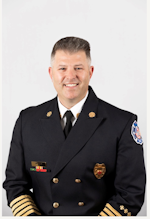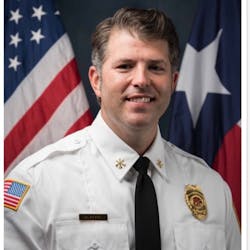So, I pretty much nerd out on movies and on TV shows/series when it comes to extrapolating leadership styles, lessons and philosophies. I still enjoy the entertainment, but I seek to find underlying meanings and inferences for life’s challenges and joys that I can learn from and use to help to grow others. Apple TV+’s “Ted Lasso” is full of leadership lessons that can help leaders to recognize how, with the right mindset and passion, they can lead with fervor, fortitude and forward-thinking. We all are judged by our actions, particularly those who embrace leadership responsibilities and roles, which, of course, should include fire service company officers.
Be kind
Ted Lasso is an American college football coach from a small school that’s located in Kansas. He takes a job in London to coach a “football,” aka soccer, team and steps into a dynamic situation to lead the team toward identity and success with several challenges to navigate. Lasso is a kind person who takes the time to know people.
Being kind simply is a great rule for life. (After all, who doesn’t need a little more kindness?) Whether it be through compliments or through encouraging words, being kind to others is a difference-maker. However, don’t confuse being kind with being a friend, because it’s important as supervisors to establish boundaries. That said, even in the midst of difficult conversations, there can be kindness. Behind every behavior is a story, a reason that drives the behavior aside from just having a “bad day.”
Princess Diana once said, “Carry out a random act of kindness, with no expectation of reward, safe in the knowledge that one day someone might do the same for you.” Although her statement follows the “golden rule,” it doesn’t appear to be followed automatically these days.
Lasso is kind even when insults are hurled his way. When judgmentalism surpasses grace and your own deepest fears are exposed out of malice, dig deep and kick the ball of kindness toward the goal.
Curiosity
Lasso loves to ask questions, then actively listens while absorbing what people give him for insight into the situation. Curiosity can conquer confusion and quash close-minded judgment when people choose to listen to others and to self-reflect on where they are in a particular conversation and where they could be if they open their heart and mind to something that’s unfamiliar.
Lasso, who knows nothing about being a “footballer,” asks questions of the players and his assistant coaches to learn the game but, even more, to learn the people.
Should Lasso learn what football in London looks like? I believe so. He realizes why he is the coach and what his players need to be a winning team whose members play for each other. This leadership trait is adaptive in nature as well as transformational. Lasso adapts to the players to understand them on a deeper level, so he can connect with them, all the while changing and affecting how they see themselves as formal and informal leaders for each other.
It’s a beautiful depiction of how, as a company officer, you can lead your crew by adapting to where they are in development as well as pouring into their desire to be better, do better and lead better.
Bench bad teammates
Lasso chooses to bench a star player in a critical match that could have a detrimental organizational outcome. Lasso’s move causes the other players to respond as a team and to rely more heavily on each other.
Lasso knew that his decision could cause additional problems for himself with the fans, the media and even the team, but he was courageously confident that the move was necessary for cultural change in the locker room and on the field.
How do we in the fire service ever get to the point of questioning someone’s commitment to the “team” when we literally rely on each other to get home to our family? A strong leader knows when to “bench” bad teammates, because that person takes the time to assess team culture and can identify with team member’s attitude is detrimental to the team’s capability to function well as a cohesive unit.
Leaders make unfavorable decisions at times, but it’s their responsibility to pull out the untapped talent through each person who reports to them by relying on those people more through encouragement, empowerment and engaging activity.
Officers, invest in your team, and if there is a bad teammate, sit that person down, explain your expectations, empower that person to change behaviors, hold that individual accountable and, if necessary, bench that person. The hope is that person will choose to be a team player, particularly after you, as the coach, invested in that individual’s story.
Never wrong?
Admitting when you’re wrong is difficult. Doing so requires you to take a humbling posture. If you are wrong, admit it and move on, because every day is a new opportunity to be a little better.
Lasso is transparent and admits when he is wrong. He allows himself to be human, and to be a good human, he models grace, forgiveness and reconciliation through his actions and words.
Teams—whether it be a crew, the shift or the entire organization—only get stronger when they are “real” with each other. Real courage is seen in difficult conversations, because a team should be capable of navigating these with core relational values and communicative norms. Feelings are real, thoughts exist, and action or inaction can be equally detrimental, but having the courage to discuss undiscussables differentiates healthy teams from toxic ones.
As an officer, admitting that you were wrong about something can humanize the position accordingly, and that single act can make a significant difference in how your people see and respect you.
Believe
I love sports movies and TV shows, because I love team dynamics: the tension and strain between coach and player or coach and coach, and the hope that exists in every situation to succeed as a team instead of individual achievements.
Lasso places a sign in the locker room that simply reads, “Believe.” What was the intent of posting that sign? Although it seems extremely cliché, how can one simple word change the culture, dynamics and determination of a team?
Ask yourself, as a leader, what should the word be for your team, the word that will inspire, convict, hold accountability and move the team to the next level? You see, Lasso gets it down perfectly and that’s because he himself believes in belief. Believing is raw and imperfect and can be problematic personally. However, when you say “believe” and you authentically believe in hope, in your team, in yourself and in the cause, it’s a game-changer.
Believing is vulnerable for us as leaders, because we must admit that we aren’t the end all, be all to solve every issue. Leaders must reach out to others and believe in them. Leaders must inspire those who are around them to try new things, to be someone who they would follow and to simply believe that, as a team that trusts each other, the victory was won long before you step onto the field, because you chose kindness, curiosity, humility and change by believing in something bigger than yourself.

Dr. Brett Ellis
Dr. Brett Ellis is a 27-year veteran of the fire service and serves as the fire chief for the city of Webster Groves, MO. He holds a bachelor’s degree in fire administration from Western Illinois University, a master’s degree in leadership and adolescent development from Huntington University and a doctorate in education from Concordia University-Portland. As a consultant (AGILE Leadership Consulting Inc.), Ellis focuses on leadership, firefighter behavioral health, conflict resolution, officer development, organizational movement, relationship building and personnel role plays that are based on fire service lawsuits. As well, he teaches for the National Fire Academy and Columbia Southern University.






